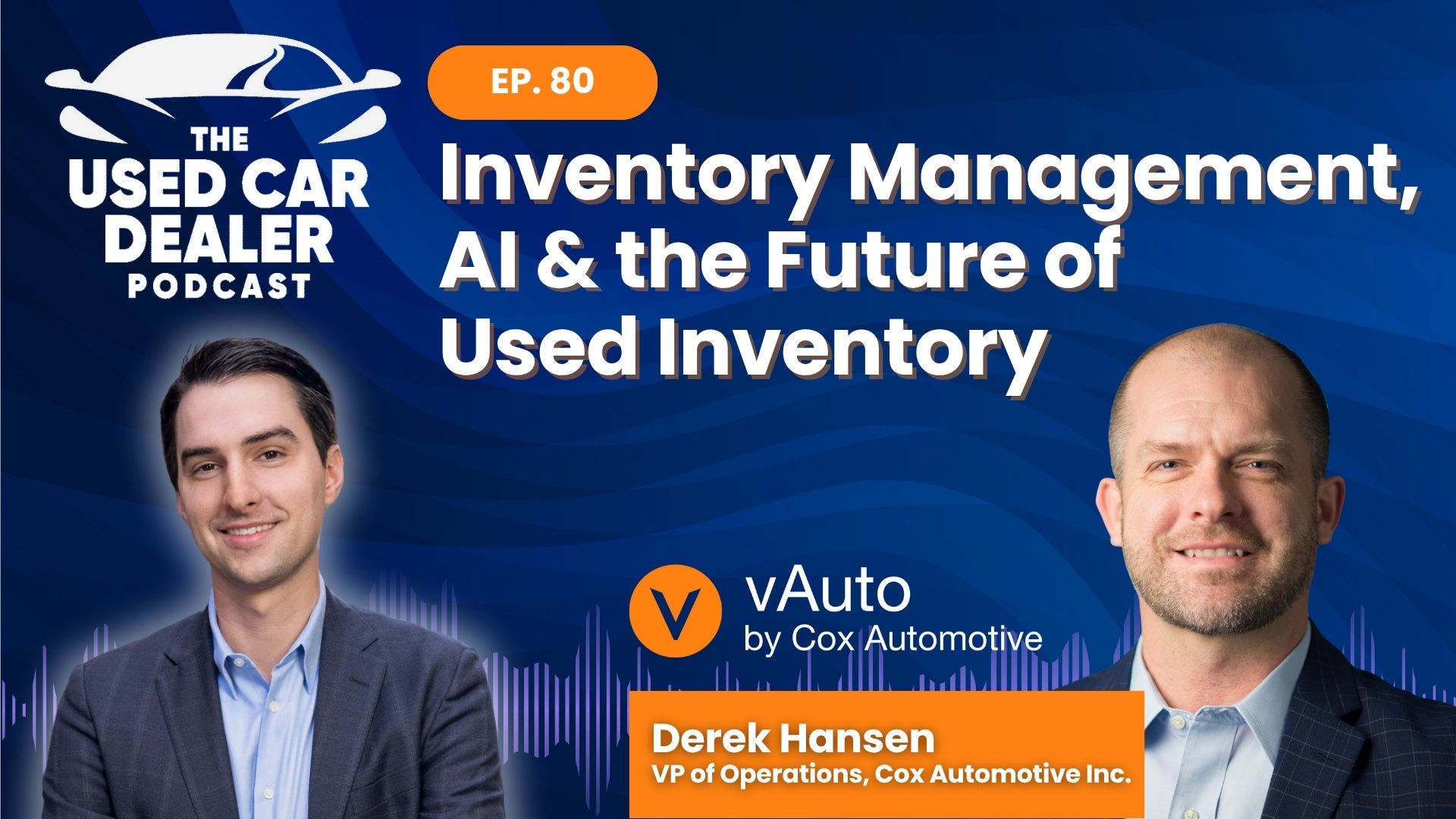In this transcribed episode of the Used Car Dealer Podcast, Zach engages in an insightful conversation with Ryan Maher, CEO of BizzyCar. They discuss the broken recall management system, how BizzyCar’s AI-powered platform is transforming the process for OEMs, dealers, and consumers, and what this means for safety and compliance.
Zach:
Zach here and today, we're excited to welcome Ryan Maher, CEO of BizzyCar. Ryan is here to discuss how BizzyCar’s AI-driven solutions are working to fix a broken recall management system, keeping consumers safe, OEMs compliant, and creating more service opportunities for dealers. BizzyCar’s recent $15 million investment highlights the urgent need in this space. So Ryan, thanks for joining me on the podcast today.
Ryan:
Thanks for having me, Zach. Great to be with you.
You know, I’m a third-generation car dealer from the Midwest, grew up in the space washing cars and learning the car business starting at 12 years of age, and really enjoyed being around cars. I mean, who doesn’t love climbing around new cars when you’re a kid, right? It’s the fantasy and the joy of doing that. We set off a couple of car alarms in the dealership on Saturdays—they didn’t always love that—but we had a passion for the car industry. Other than five or six years in the Marine Corps, I’ve been in this a long time.
One of the things about automotive is that there are multiple businesses inside of one, especially on the retail side. We sell cars, we finance cars, we sell parts, and we fix cars. Recalls were always a part of that, but I just didn’t realize how many recalls were out there until Takata airbags happened. We were getting hammered from our OEMs on Takata, and BizzyCar really started because one of our OEMs sent me an email on a Saturday telling me we had a recall problem in our PMA, in our backyard, and we needed to fix it.
I was just tired of getting those emails, and we said there’s gotta be a better mousetrap. We went to AutoTrader and started looking for used cars in our backyard that might have those recalls sitting on other dealer lots. As it turns out, we were right. In our very first month, we made $40,000 going out there, finding used vehicles that had recalls, getting them repaired, and driving them into the service department. Shortly thereafter, COVID hit, and we realized we had to fix these cars—it was the only way to keep our technicians employed. The rest is kind of history.
Zach:
That’s awesome. And just this year, there are 21 million plus recalls—5 million we just released today—wow. So what are some of the biggest challenges in the current recall system? Why do you think it’s so difficult for the auto industry to address these efficiently?
Ryan:
Recalls are massive in scale. Over 70 million cars today have an open recall. About 25 million recalled so far this year, and 30 million last year. At least from my humble opinion, the reason why is because cars have just gotten so complicated. People forget that Ford, Nissan, Toyota, Volkswagen—they’re car manufacturers, but really they’re car assemblers. They have thousands of subcontractors and vendors, and they’re hoping nothing goes wrong with the products they’re assembling.
Think of your car today: heated seats, cooled seats, drink holders, lumbar support, all these electrical pieces. Cars are just super complicated. When something goes wrong, it has to be repaired via a recall. A lot of them, unfortunately, are safety issues. Even companies like Tesla, with brand new software-defined architecture vehicles, have recalls. Some they can fix over the air, but the Cybertruck this year had five or six recalls, and one required bringing the vehicle in to be repaired. Even the biggest or newest car manufacturers struggle with the complexity.
Zach:
You recently announced a $15 million growth round. What changes should we expect to see from BizzyCar in the next six months, especially with these pain points in the recall space?
Ryan:
Our core product works by going into the dealership, integrating into the DMS and the service scheduling system, and then automatically reaching out to consumers to let them know they have a recall and getting them scheduled for an appointment. That’s the magic of BizzyCar—it’s pure automation.
We’re really excited about the $15 million growth round from Dealer Tire—$30 million raised to date. With this $15 million, we can do two things. One, we’re going to double down on our technology. We’re doing a tremendous amount of R&D with AI, improving our AI algorithms, enhancing our customer communication, and launching some new products we’re really excited about.
Second, we’ll be hiring. We’re looking to hire about 40 people right now. We have two new hires starting next week, and we’ll do the bulk of that hiring in early 2025.
Zach:
Super impressive. Shifting gears a bit, I’ve noticed a trend toward mobile service. How does that affect customer relations, and what are your thoughts on this mobile service trend?
Ryan:
Huge opportunity. Think about it—right now, where’s your car? Probably at your home or office. Consumers in 2024 want convenience and a great customer experience. You can get a salad delivered via Uber Eats or DoorDash—why can’t we do the same for auto repair?
The industry has to do this because consumers demand it. The challenge is doing it profitably. That’s where technology comes in. Many manufacturers have tried mobile service, but didn’t have the tech to make it efficient enough to be profitable.
We’re really focusing on routing, dispatching, optimization, payment integration, photos—all the things that exist in the store need to exist out in the field. We’ve spent the last two or three years building this mobile app and have really doubled down on it. Just this year alone, we added over 500 dealers to the mobile app.
Zach:
Let’s talk more about the software. How does BizzyCar’s AI platform streamline the recall process for OEMs, dealers, and consumers?
Ryan:
You can’t be a software company today without AI in your ecosystem. We use AI in two areas. One is customer communication—think ChatGPT, Google Gemini. Instead of reinventing the wheel, we use Microsoft and Amazon’s best-in-class services and have built custom models for recalls and service. This has been incredibly effective. We’re booking tens of thousands of appointments using that communication every week.
The other area is optimization. Dealers currently must manage shop loading, capacity, and other data manually. AI helps us make things run more efficiently. We have huge training sets of data—thousands of customers and dealers—and we can apply AI models to run stores more efficiently. If a mobile truck can do three appointments in the morning instead of two, that’s huge. We have some great stuff coming out in 2025 we’ll share when the time is right.
Zach:
What are some common mistakes dealerships make in managing recalls, and how does BizzyCar help them avoid these pitfalls?
Ryan:
Number one: They forget about parts. The parts manager is often overlooked. If the recall part isn’t available, you can’t service the vehicle. With BizzyCar, we’re directly integrated with the OEM. We don’t just get recall data; we get parts and supply chain info. If you don’t have the part, you can’t do the repair. We’ve eliminated that issue.
Second: Many dealerships give recalls to their BDC, but BDC reps might not know how to answer complex recall questions. Some recalls require removing an entire dash, or applying the right technician at the right time. The BDC might not know all this.
We’ve solved this by automating and controlling for these factors. We handle so many appointments, we know the tricks of the trade and have automated them, making a better experience for everyone.
Zach:
With safety on the line, recall compliance is critical for OEMs. How do BizzyCar’s solutions support compliance and transparency?
Ryan:
Compliance means many things. We must follow federal regulations—TCPA, CAN-SPAM compliance—and be truthful. You can’t upsell the consumer on a recall. There are state-level rules too. California, for example, has strict opt-out requirements and rules about upselling.
We also operate internationally—in Canada now, and maybe other places soon—so we must follow their rules. Recalls are safety issues. A Takata airbag can kill you. We must fix these problems before they hurt someone, while navigating federal, state, and international regulations.
Zach:
Many dealerships struggle with labor shortages and resource constraints. How easy is it for a dealership to integrate BizzyCar into their current workflow?
Ryan:
We’re completely touchless. That’s the beauty of BizzyCar. We integrate into the DMS and scheduling system, flip a switch, and the dealer doesn’t have to touch it. No training, no login.
For a dealer principal or GM, that’s incredibly powerful. We can increase your gross profit by $20,000 a month without you having to do anything. With labor shortages, dealers love this. Plus, mobile service can attract technicians who never would have worked in a hot shop environment. They can be out on the road, controlling their destiny. It’s a great way to bring people into our industry.
Zach:
Could you share a success story where BizzyCar significantly improved recall completion rates or boosted service opportunities?
Ryan:
We have a big dealer group in the Northeast, about 30 stores. Last month alone, they saw almost $600,000 of new revenue. That’s incredible.
We measure something called DSLV—Days Since Last Visit. We average 600 days since the customer’s last visit. So the recall brings back customers who left years ago. Once they have a great experience, maybe they want to buy a car. It’s great for retention. We have testimonials and videos on our website. The product is fully automated, and the ROI is real.
Zach:
Looking into the future, what role do you see AI playing in recall management, and can we look forward to any new developments from BizzyCar in 2025?
Ryan:
AI will be everywhere. There’s a lot of repetitive administrative work in recalls, and AI can automate it. Whether it’s identifying recalls upstream, analyzing parts and supply chain, or optimizing capacity so we can focus on a new recall right away, AI can boost completion rates dramatically—into the 80-90% range within six months of a recall announcement. That’s triple the normal rate.
We want to move away from old methods like mailing letters to a more interactive experience. With our text message integration and AI, we can schedule the recall directly. We ensure parts availability, capacity, and technician readiness. We’ve got some great demos, and 2025 will be exciting.
Zach:
Finally, what advice would you give dealers on staying proactive and effective in recall management?
Ryan:
As a dealer in 2024, the gravy train of huge grosses is over. You must focus on fixed ops, and recalls are critical. One in four cars has an open recall. That’s thousands of at-bats to bring customers into your store cheaply and effectively.
Mobile service is a greenfield opportunity. Don’t lose customers to Jiffy Lube or Firestone—go mobile and retain them. With EVs around the corner, have an EV strategy that includes mobile. We’re obsessed with fixed ops and delivering a great dealer and customer experience.
Zach:
Ryan, it’s been great talking to you. I’ve learned a lot about recall management. Thanks for joining me on the podcast today.
Ryan:
Thanks for having me, Zach.
UCDP #69 – AI-Powered Recall Platform with Ryan Maher of BizzyCar
December 18, 2024|
Zach Klempf
.jpg)
Tags: used car dealers automotive industry auto industry auto industry trends used car market independent dealership

.png)




.jpg)
.jpg)
.jpg)
.jpg)

.png)
.png)
